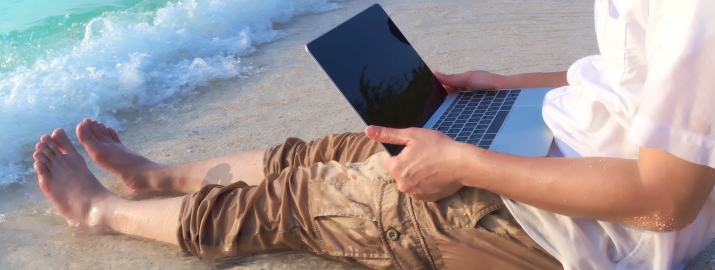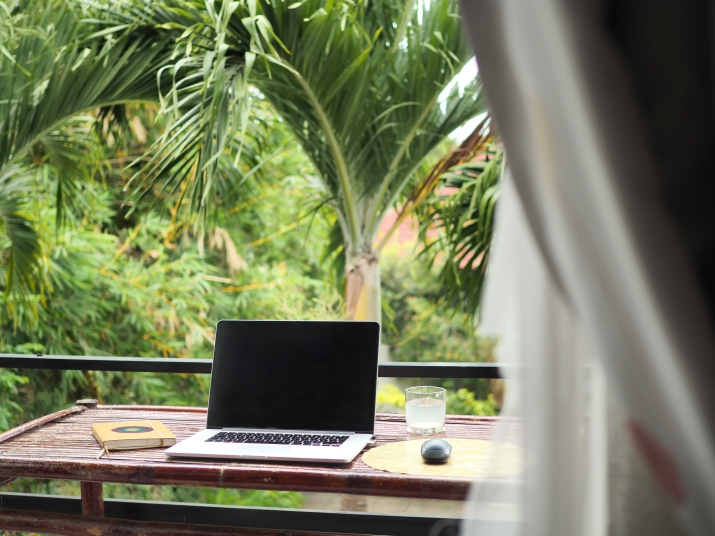
Workation for Beginners: All You Need To Know
Although the words “work” and “vacation” used to contradict each other in the past, in our world today, with the flexibilities brought about by remote working, a new concept found ground to emerge, and it’s called “workation”. The new order of the world has enabled us to combine the said two words and work on vacation.
In this article, I’ll elaborate on this new phenomenon that appears quite promising to many remote workers. Read on if you’re interested to learn all about workation: its types, best countries for a workation, and tips for having a decent one. Here we go!
This article covers
- Types of workation
- Advantages and disadvantages of workation
- The best workation destinations
- Tips for a good workation experience
…and a lot more.
Types of Workation
A workation is an experience where work and vacation are combined outside the office. Simply put, workation is working while on vacation or vacationing while continuing to work.
Since it’s a newly found phenomenon, the amount of work to be done that separates workation from just a vacation is not very clear yet. However, it can be said that to what extent you should work while on a workation is subjective, meaning it’s kind of up to you. In that case, I suppose, we can set the bar to doing a satisfactory amount of work.
How long does a workation take, then? Well, it’s not possible to define any workation precisely, they can have various characteristics and different lengths. However, there are three main types of workation, depending particularly on the length. These general workation types are as follows:
1. Short term workation
2. Medium term workation
3. Long term workation
1. Short-Term Workation
Short-term workation is like a weekend break that also involves work. Short-term workations typically last two or three days and are taken at places close to the place of residence.
A person who’s taking a short workation can travel to many locations in the world, so long as they can have a brief train ride or a short-haul flight.
A short-term workation is like a quick refresher, a brief change of scenery.
2. Medium-Term Workation
A medium-term workation usually lasts about a couple of weeks. To specify further, it’s typically between a week and a month. Someone who takes a medium-term workation may work from the beach for a few weeks, or spend a month or so abroad. Medium-term workations are generally taken within the continent.
To my opinion, a medium-term workation is the best of all because it gives you time to actually relax and the arrangement itself to actually produce the desired outcome.
3. Long-Term Workation
A long-term workation can last several months or even a few years. It is simply to temporarily relocate to a different location than your hometown and continue working remotely from that destination.
This type of workation naturally requires a more complex organization process since the country of destination may demand a long-term visa or a work permit. Luckily, to keep up with such trends as workation, many countries are issuing special visas for remote workers.
You can go anywhere you dream of for long-term workations: from the exotic beaches of Thailand to the Italian Riviera.

Pros and Cons of Workation
Going on a workation has its perks and downsides. It can benefit you in many ways but you can come across challenges as well. But is it worth the trouble?
Let’s find out by making a list of pros and cons:
Pros
The pros of a workation definitely exceed its cons, if you ask me. Although it requires a tiny bit of adaptation, after settling your ways of working abroad effectively, workations will probably have an excellent effect on both your well-being and career.
Increases productivity
Going on a workation usually leads to increased productivity. The change of scenery, having fewer chores to deal with, and much less distraction during the day, all help us to become more productive throughout the work hours. After all, not a lot of people can interrupt you while you’re working on a beach in the Canary Islands.
An increase in your productivity is beneficial for both you and your company, which will lead to a motivation boost, and hence to more productivity.
Enhances the quality of the work
Not only that you‘ll get a lot of work done, but also the quality of the work you’re doing will scale up when you go on a workation. Having less pressure and more flexibility, and getting refreshed by the change of pace helps improve work quality to a great extent.
The only thing that you should do is to establish solid self-discipline and stay organized to The only thing that you should do is establish solid self-discipline and stay organized to increase your productivity and quality of work as you’re workationing.
Stimulates creativity
Due to fewer distractions and work-unrelated tasks to be done throughout the day, most workationers experience a rocketing in their creativity. Of course, the role of being someplace new or in nature, or seeing some stunning architecture in boosting creativity cannot be overlooked. Traveling is always inspiring.
Staff stability
This perk goes both ways: for the company and the staff. A workation helps the employees to become more productive and have a pleasant experience at the same time. A happy and productive personnel is always good for business because it leads to staff retention.
As for the staff, in addition to the short-term contentment, the success and stability they establish in their work constitute a general convenience in their professional and personal lives.
Traveling
One of the best parts of workation is, for sure, is that it allows you to travel while you work. There’s no motivation like being able to experience new things after each workday.
Cons
Unfortunately, nothing’s handed to us on a silver platter. A workation also comes with its own set of challenges. Find below some of the downsides of workation, which are all conquerable, of course!
Challenging to establish a work-life balance
It’s already a challenge to find a healthy work-life balance when you’re working remotely. When you’re on workation, on top of it, the thin line between work hours and personal time can get even blurrier.
Preparing ahead by setting a solid schedule and sticking to it is generally the key to a good work-life balance. Unplugging when your work hours are over, and taking one task at a time are other tips for finding a balance. Enjoying the workation instead of stressing out will be healthier and more fruitful for both you and your professional life.
Being away from home and personal belongings, and lack of amenities
Being away from home, family, and friends can be challenging at times. More importantly, though, being away from certain tools that help you work productively, a good internet, certain appliances, or software can have a negative impact on your productivity. However, it’s possible to find substituting solutions to get your tasks done without falling behind. It only takes good planning and a little research.
Technical requirements
One downside of overseas workation is the permits/visas it requires. A tourist visa won’t allow you to work in most countries. However, there have been regulations made and remote work visas established by many countries to allow people to work abroad, to keep up with the trend.
Dealing with visas, work permits, and taxation can take a bit of time and energy, but it’s worth bearing with them in order to have a change of pace and a productivity boost simultaneously.
What Makes the Perfect Place for a Workation
Naturally, there are a few factors that narrow down the destination options for a workationer. Considering the aspects below might help you decide on your workation location:
- Limits of your budget
- The accessibility of the destinations you have in mind
- Your commitments back at home
- Visas, permits, and taxation that the potential destinations require
Upon narrowing down your options to a few, you can pick your workation destination following some criteria. The most significant of these criteria are as follows:
- Convenient cost of living
- Tranquility
- Access to high-speed internet
After planning your budget, establishing your potential needs, and arranging your responsibilities back at home, all the world is your workplace; you can choose any destination you like. Whether your workation destination will be the Hawaiian beaches, the streets of Rome that tell of a prosperous history, or a beautiful Bavarian town is almost entirely up to you.

The Best Countries for Workation
As I’ve mentioned earlier, digital nomad visas special to remote workers are on the increase nowadays, as countries try to keep up with the changes that are mostly brought about by the COVID-19 pandemic.
The COVID-19 pandemic has made companies from various lines of work notice that remote working can be a very effective work mode. Countless people and firms shifted to remote work and started doing their jobs location-independently. Hence, many countries took steps to adapt to this new work mode by introducing special visas for remote workers. These visas, however, are only given to digital nomads and employees who are working remotely and meet some requirements such as exhibiting proof of income indicating a certain amount or a minimum monthly salary.
Find below the countries that issue remote work visas at present:
- Norway
- Anguilla
- Barbados
- Germany
- Aruba
- Costa Rica
- Bermuda
- Portugal
- Cayman Islands
- Croatia
- Estonia
- Dubai
- Jamaica
- Georgia
- Spain
- Antigua and Barbuda
- Mexico
- Czech Republic
Related Articles
How To Plan a Workation
We’ve already talked about the most suitable countries to go on a workation and the characteristics that make a place favorable for a workation. Now, let’s talk about the steps of planning a workation other than picking a destination.
Accommodation
Getting the accommodation right is one of the most crucial aspects of a successful workation. You need to have access to all the relevant amenities to remote-working at the place of your stay. Find below what your accommodation should offer for you to have a productive workation:
- Peace and quiet: Your workspace should be distraction-free and quiet. Picking a place a little further away from the main streets, get-together places, bars, or immense transportation points will allow you to stay focused while working and not get interrupted by the noise. It’s best if it’s not a common space where other people hang out for work-unrelated activities. Picking a place otherwise will prevent you from procrastinating by chatting with people or getting distracted by their talks or the movement around you.
- Strong internet connection: This is, of course, by far one of the most essential things for a remote worker whose job completely relies on their laptop and a good internet connection. Having an unstable WiFi connection is a productivity killer. Even a short disconnection may completely ruin your workday by destroying your attentiveness just for a couple of minutes. Hence, before hiring a place for a workation, check multiple times if the relevant accommodation option offers excellent access to the internet.
- A functional workstation: A workstation is another absolutely necessary amenity an accommodation should offer to a workationer. To work for a solid six to eight hours during a day, you need a wide desk and a comfy chair. It’s important that a workstation be free from distractions, adequate for all your work equipment to fit on, and also feel cozy. You can also look for nearby coworking spaces or coffee shops if you prefer to work outside or make a change occasionally.
Considering all these accommodation aspects that are crucial for a successful workation, the best option seems to be renting a flat or even a detached house through Airbnb. This way you can get more comfortable where you have the whole place to yourself, and cut back on your expenses because you’ll have access to a decent kitchen where you can cook instead of eating out or ordering.
Timing
Another substantial thing that should be taken into account when going on a workation is the timing. If you have adequate financial means and iron will against distractions, you can go on a workation anytime, anywhere. If you don’t possess these, on the other hand, it makes sense to pick a time for your workation during the low season. This will allow you to experience a more affordable and less crowded stay, both of which will have a positive impact on your workation. Increasing your productivity and living standards simultaneously.
The low season typically means the off-summer season for many countries. The best times for a workation, in this sense, might be early spring or autumn. This is because there’s less tourist activity and the weather is milder compared to winter. Hence, going on a workation during the said periods allow you to experience a more enjoyable stay in return for lower travel and accommodation prices.

Packing for a Workation
Packing can always be a challenge when you’re leaving home, especially if it’s for a long-term trip. You can be a light traveler who takes only the essentials with you when you’re going on a vacation. However, with a workation, the packing situation is slightly different. This difference derives from the length of the workation and the need for various pieces of equipment to establish an effective remote work order.
To make sure you pack everything you may need, preparing a packing list ahead and checking it multiple times while packing is a helpful strategy. It never hurts to pack backups for your essentials such as laptop adapters, phone chargers, and batteries. If you’re prepared, you won’t have trouble staying disconnected from work until finding solutions in case one of these devices break.
Tips for a Successful Workation
I kept going on about how great a workation will work out for you. However, sometimes workations can go awry, unfortunately. You may not be able to adapt to the change, may get overwhelmed by work, or too distracted by your new surroundings or the urge to wander around. Don’t worry, though, I sure have a couple of tips for you to have a successful workation that you’ll enjoy every last bit of!
Plan a schedule
Plan your workation in advance and in detail. Pick the right accommodation where you can set up a neat workstation, and figure out the strategies that work best for you to have effective and productive work hours. Try to establish your own ways to get more work done within a little while.
Most importantly, though, make sure you plan your schedule really well. Set your work hours and stick to them. For instance, establish a schedule where you’ll work five or six hours Monday to Friday. You can be flexible, of course, but don’t go crazy.
Pay attention to your work-life balance
Try and establish a healthy work-life balance while you’re remote-working abroad, Keep your work and leisure times separate, and stick to these adjustments. Try to unplug when your set work hours are completed. A workation can go all wrong if you’re over-stressed or mistake it for a mere vacation.
Find a companion or delegate if possible
Going on a workation with a colleague or another fellow remote worker makes a better experience. Find someone you’re compatible with both for travels and work orders, and plan the workation with them, if possible. If not, you can find someone to supervise your preparation process, remind you of stuff in case you forget about them, and throw in some extra ideas through a fresh pair of eyes.
Choose and organize the workspace
Establishing a proper workstation and organizing it to your needs is one of the most crucial steps toward a successful workation. It’s best to have established one or more specific workspaces from the very start of your workation.
I, for one, prefer Airbnbs with large desks to fit my laptop, phone notebooks, and coffee cup, and still have space not to get overwhelmed by the abundance of stuff around me. I also pick a couple of coffee shops, coworking spaces, or libraries to have a change of scenery when I need to.
Pack the right tools
Make sure you got everything you need as you pack. Having all the essential tools for you to work effectively without having any interruptions is crucial to have a successful workation. Make sure you get all the batteries, adapters, charges, and the like, and spares for these if you have adequate space. Preparing a packing list always helps.
Pick a workation-friendly destination
In addition to choosing a workation-friendly country where you can more effortlessly obtain a remote-worker visa, picking a work-friendly location where you can work uninterruptedly is very important as well.
According to your working habits, you can opt for a house in a tranquil town that’s quiet day and night, a cabin in the nature or a beach house at a golden beach, or a flat in a relatively less crowded alley of a big city, where you can work without being distracted during the day and enjoy the lively urban scenery at night.
Workation Trend: The Wrap-Up
Working location independently is the bliss of our times. Especially after the pandemic, such remote work opportunities have been increasing in number day by day. If you’re a remote worker as well, who’s been fulfilling their tasks from their couch, traveling only between the rooms of their house for a change of air, you should definitely take your shot at a workation and see if it suits your mood.
So long as you plan your workation and budget ahead, and set a few rules for yourself and a schedule to stick to, you’ll have an incredibly enjoyable and productive experience. Plus, you won’t believe how affordable a workation can be if you research and be well-prepared beforehand.
Working abroad in a beautiful place, and getting to experience something new stimulates creativity, and enhances productivity and the quality of the work done. In addition to contributing to your professional life, a workation provides you with a change of pace, a very enjoyable timeout from the monotonous life at home.
Go ahead and take a workation: an experience of relaxation and productivity, that’ll maybe even lead your way toward a career advance. Be careful not to become a workation addict!
